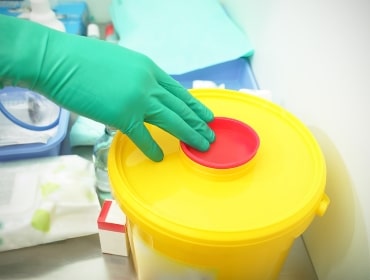All Points Medical Waste Blog
Disposal of Chemotherapy Waste: Ensuring Safety and Compliance

Chemotherapy waste represents one of the most dangerous types of medical waste in healthcare facilities across Florida. Unlike standard medical waste, chemotherapy drugs contain powerful cytotoxic agents designed to destroy cancer cells, making them extraordinarily hazardous to anyone who might be exposed.
Healthcare facilities in West Palm Beach and throughout South Florida must understand that chemotherapy waste cannot be treated like regular medical waste. The toxic nature of these substances requires specialized handling, segregation, and disposal protocols that go far beyond standard procedures.
Why Chemotherapy Waste Is Exceptionally Hazardous
Chemotherapy drugs are designed to be toxic to cells, which makes them effective cancer treatments but also creates serious environmental and health risks. These substances can remain active long after treatment, posing threats through:
- Direct skin contact: Can cause burns, rashes, and systemic toxicity
- Inhalation exposure: May lead to respiratory problems and organ damage
- Environmental contamination: Persists in soil and water systems
- Secondary exposure: Affects cleaning staff, waste handlers, and the general public
The reality is that even trace amounts of chemotherapy drugs can pose significant health risks. This is why specialized hazardous waste disposal protocols are absolutely essential for any facility administering chemotherapy treatments.
Florida and Federal Compliance Requirements
Healthcare facilities managing chemotherapy waste must comply with multiple regulatory agencies, each with specific requirements:
- OSHA Standards: The Occupational Safety and Health Administration requires comprehensive employee protection measures, including proper personal protective equipment, training programs, and exposure monitoring protocols.
- EPA Regulations: The Environmental Protection Agency classifies many chemotherapy drugs as hazardous waste, requiring facilities to follow Resource Conservation and Recovery Act (RCRA) guidelines for treatment, storage, and disposal.
- DOT Transportation Rules: The Department of Transportation has strict packaging, labeling, and manifest requirements for transporting hazardous chemotherapy waste.
- Florida State Requirements: The Florida Department of Health adds additional layers of compliance, particularly for facilities in counties like Palm Beach, Broward, and Martin Counties.
Critical Steps for Safe Chemotherapy Waste Management
Proper Segregation at Point of Generation
Segregation must happen immediately when waste is created. This includes separating chemotherapy-contaminated materials from regular biomedical waste and using specially designed containers that prevent leakage and cross-contamination.
Specialized Container Systems
Regular red bag containers are insufficient for chemotherapy waste. Facilities need chemotherapy-specific containers that meet Department of Transportation specifications and provide multiple layers of protection. Proper container selection is crucial for compliance and safety.
Comprehensive Staff Training
Every team member who might encounter chemotherapy waste needs extensive training. This isn’t a one-time requirement—ongoing education ensures that staff stay current with evolving regulations and best practices. Professional compliance training programs provide the foundation for safe handling procedures.
The Role of Licensed Medical Waste Companies
Managing chemotherapy waste internally is neither practical nor advisable for most healthcare facilities. Licensed medical waste companies bring specialized expertise that ensures:
- Regulatory compliance: Stay current with changing federal and state requirements
- Proper treatment methods: Use appropriate technologies for hazardous waste destruction
- Environmental protection: Prevent contamination through proven disposal methods
- Documentation support: Provide complete chain of custody and disposal certificates
For healthcare facilities serving patients in areas like Fort Pierce, Jupiter, and throughout Lee County, partnering with an experienced provider eliminates compliance risks while protecting staff and community safety.
Protecting Your Facility and Community
Chemotherapy waste disposal isn’t just about following regulations—it’s about protecting everyone who might be exposed to these dangerous substances. From your clinical staff to waste handlers to the broader community, proper disposal prevents serious health consequences.
Healthcare facilities across Florida cannot afford to take shortcuts with chemotherapy waste. The risks are too high, and the regulatory consequences too severe. Working with a trusted, licensed medical waste disposal company ensures that your facility maintains the highest standards of safety and compliance.
At All Points Medical Waste, we understand the critical importance of proper chemotherapy waste disposal. Our specialized services help cancer centers and healthcare facilities throughout Florida maintain compliance while protecting their staff and patients.
Call us at (772) 600-4885 or complete the form on this page today! Don’t risk the safety of your facility, staff, or community with improper chemotherapy waste disposal. Partner with Florida’s trusted medical waste management experts for complete peace of mind.

